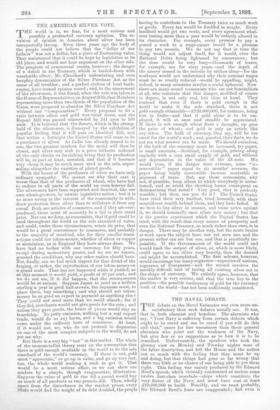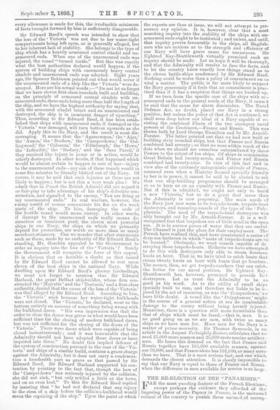THE NAVAL DEBATE. T HE debate on the Naval Estimates was
even more un- satisfactory than such debates usually are. It was, that is, both alarmist and hopeless. The alarmists who say, "Your Navy is suffering from certain defects which ought to be cured and can be cured if you will do this and that," cause far less uneasiness than those general alarmists who point out the weakness of the Navy, but give few or no suggestions as to how it is to be remedied. Unfortunately, the speakers who took the gloomy view on Monday and Tuesday nights were of the latter description, and left the House and the nation not so much with the feeling that they must be up and doing, but that things had gone so far wrong that there was little or no chance of our being able to put them right. This feeling was mainly produced by Sir Edward Reed's speech, which virtually condemned as useless some twelve first-class ironclads—ships which constitute the very flower of the Navy, and must have cost at least A110,000,000 to build. Possibly, and we trust probably, Sir Edward Reed's fears are exaggerated ; but even if every allowance is made for this, the irreducible minimum of facts brought forward by him is sufficiently disagreeable.
Sir Edward Reed's. speech was intended to show that the loss of the 'Victoria' was not due to her water-tight compartments being left open, as is generally alleged, but to her inherent lack of stability. She belongs to the type of ship which has a heavily armoured central citadel and un- armoured ends. When one of the unarmoured ends was injured, the vessel "turned turtle." But this was exactly what the best authorities declared would happen, if the system of building ships with enormously heavy central citadels and unarmoured ends was adopted. Eight years ago, Sir Spencer Robinson pointed out what would occur if the unarmoured ends of a ship like the ' Victoria' were de- stroyed. Here are his actual words :—" Do not let us forget that we have eleven first-class ironclads built and building, on the principle of armoured central citadels with un- armoured ends, these ends being more than half the length of the ship, and we have the highest authority for saying that, with the armoured citadel intact and an unarmoured end destroyed, the ship is in imminent danger of upsetting." Thus, according to Sir Edward Reed, it has been estab- lished that ships with unarmoured ends, if damaged as the Victoria' was damaged, will turn bottom upwards as she did. Apply this to the Navy, and the result is most dis- couraging. It means that the Agamemnon,' the ' Ajax,' the 'Anson,' the 'Benbow,' the ' Camperdown,' the Col- lingwood,' the Colossus,' the Edinburgh,' the Howe,' the Inflexible,' the 'Rodney,' and the Sans Pareil,' if they received like injury in peace or in action, would be utterly destroyed. In other words, if that happened which would be almost certain to happen in case of war—injury to the unarmoured ends—any one of these vessels would in some five minutes be literally blotted out of the Navy. Of course, it may be said that such injuries as these are not likely to happen ; but is not this a very weak plea i' We admit that in Punch the British Admiral did not regard it as fair-play to take advantage of his ship's defective con- struction, and signalled to the enemy, "You are firing at my unarmoured ends." In real warfare, however, the enemy would of course concentrate his fire on the weak parts of the ship. To him, damaging the ends of the hostile vessel would mean victory. In other words, if damage to the unarmoured ends really means de- struction or imminent peril, the eleven most powerful ships in our Navy, the ships on which we primarily depend for protection, are worth no more than so many merchant-steamers. Can we wonder that after statements such as these, made by an authority of Sir Edward Reed's standing, Mr. Goschen appealed to the Government to order an inquiry into the loss of the ' Victoria ' P Surely the Government will recognise the force of this appeal. It is obvious that so horrible a doubt as that raised by Sir Edward Reed cannot be allowed to rest upon eleven of the best ships in the national Navy. While dwelling upon Sir Edward Reed's gloomy forebodings, we must not forget to mention that Sir Edward Harland, the great Belfast shipbuilder, whose firm con- structed the' Majestic' and the' Teutonic,' and a first-class authority, denied that the cause of the loss of the 'Victoria' was that alleged by Sir Edward Reed. According to him, the ' Victoria ' sank because her water-tight bulkheads were not closed. The 'Victoria.,' he declared, went to the bottom entirely on acconut of something being wrong with the bulkhead doors. "His own impression was that the order to close the doors was given in what would have been sufficient time for the closing of modern bulkhead doors, but was not sufficient for the closing of the doors of the 'Victoria.' There were doors which were capable of being closed instantaneously ; and it was lamentable that the Admiralty should not have adopted those doors or have inquired into them," No doubt this implied defence of the system of construction pursued in the ease of the ' Vic- toria' and. ships of a, similar build, contains a grave charge against the Admiralty, but it does not carry a condemna- tion a hundredth• part as grave as that passed by Sir Edward Reed. Sir Edward Harland supported his con- tention by pointing to the fact that, though the bow of the Camperdown ' was seriously injured by the collision, she did not sink, "but only settled a little at the bows, and on an even keel." To this Sir Edward Reed replied by insisting that "he had not declared that any injury to the stem of a skip before the collis:on-hulkhead would memn the capsizing of the ship." Upon the pint at which the experts are thus at issue, we will not attempt to pro- nounce any opinion. It is, however, clear that a most searching inquiry into the stability of the ships with un- armoured ends ought to be instituted ; and unless, and until, that inquiry proves favourable to the ships, all English- men who are anxious as to the strength and efficiency of our Navy will have grave cause for uneasiness. Sir Ughtred Kay-Shuttleworth virtually promised such an inquiry should be made. Let us hope it will be thorough, and that the Admiralty will resolve to face the facto, and to let the country know exactly how things stand as to the eleven battle-ships condemned by Sir Edward Reed. Nothing could be worse than a policy of concealment on so vital a matter. The public is far more likely to suppoit the Navy generously if it feels that no concealment is prac- tised than if it has a suspicion that things are hushed up. If we turn from the specific case of the ships with nr- armoured ends to the general needs of the Navy, it calm t be said that the cause for alarm diminishes. The Naval Defence Act, no doubt, placed our Navy in a strong position, but unless the policy of that Act is continued, we shall soon drop below our ideal of a Navy capable of re- sisting the combined Fleets of the two strongest naval powers of the Continent,—France and Russia. This vas shown both by Lord George Hamilton and by Mr. Arnold- Forster. The latter pointed out that we had now built or building sixty ironclad ships, but that France and Russia combined had seventy ; so that we were within reach of the date when we should see ourselves outnumbered by ilea°. Powers to the extent of ten ships. Of ships in commission Great Britain had twenty-seven, and France and Russia combined had twenty-nine. In view of this fact and in view also of the extremely antagonistic attitude of France, assumed even when a Ministry deemed specially friendly to her is in power, it cannot be said to be absurd to ash that our ship-building programme should be arranged so as to keep us on an equality with France and Russia. But if this is admitted, we ought not only to build a new Victoria,' but to do a great deal more than the Admiralty is now proposing. The main needs t the Navy just now seem to be torpedo-boats, torpedo-beat destroyers, and ramming-vessels of the type of the Poly- phemus.' The need. of the torpedo-boat destroyers was ably brought out by Mr. Arnold-Forster. It is a well recognised fact that torpedoes are of little avail in the open sea. It is in narrow pieces of water that they are useful. The Channel is just the place for their employment. The- French have realised this and have constructed a series of deep-sea harbours in which "nests of torpedo-boats are to- be located." Obviously, we want vessels capable of de stroying these torpedo-boats. Hitherto we have attempted to do this with destroyers only able to steam fourteen,- knots an hour. That is, we have tried to catch boats that- steam twenty knots an hour with boats that go fourteen,. The sooner, then, we get torpedo-catchers that can catch, the better for our naval position. Sir Ughtred Eay- Shuttleworth has, however, promised to provide lint destroyers. Let us trust the Admiralty to be is good as his word. As to the utility of small ships specially built to ram, and therefore not liable to 'be jured by the act of ramming, as was the Camperdowsn' 'we' have little doubt. A vessel like the 'Polyphemus 'might in the course of a general action at sea do incalculable damage to the enemy without being herself injured. Meantime, there is a question still more formidable Asses that of ships which must be faced,—that is, men. It ie., no good going on as we are now, with twice as many ships as we have men for. More men for the Navy is matter of prime necessity. Sir Thomas Symonds, in au, article in the August Folnightly Review, calculates that va,- need 25.000 more seamen and 26,000 more marine artillery - men. He bases this demand on the fact that Mime and Russia together have 185,000 available seamen, against our 79,000, and that France alone has 131,000; or many more- than we have. That is a most serious fact, and one which demands the closest attention. It is clearly impossible to. say that our Navy is equal to those of France and Russia _ when the difference in men available for service is salarge..



































 Previous page
Previous page